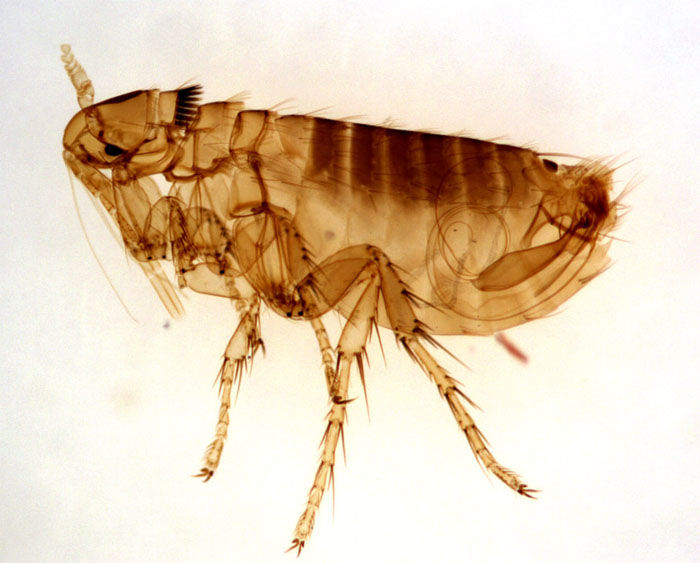Have a Flea Problem?
Flea Exterminator Costs
According to pest control experts, the average cost to hire a professional flea exterminator for a typical single family home is $200-$400 per treatment.
According to HomeAdvisor, the average flea treatment cost is $283 but can range from $100 for a small home up to $400 for a large home requiring extensive treatment. Most homeowners need 2-3 treatments spaced 2 weeks apart.
Angie's List indicates that total flea removal costs often are $500-$1,000+, with professional treatments starting at $250 per service. Severe infestations or multifamily buildings cost more.
| Home Size | Treatment Cost Range |
|---|---|
| Small Home (under 1,500 sq ft) | $150-$250 |
| Average Home (1,500 - 3,000 sq ft) | $200-$400 |
| Large Home (over 3,000 sq ft) | $300-$500 |
Ask the Flea Expert
Answers provided by veterinarian Dr. Jeff Werber, DVM, with over 35 years of experience practicing veterinary medicine. He founded Century Veterinary Group and was President of the Association of Veterinary Communicators.
How does my pet get fleas? "Fleas can spread from pet to pet, but they usually have an intermediate host like bushes, grasses, or trees where pets pick them up when playing outside or on hikes. Fleas also can be carried inside on your shoes or clothing if you go outside and bring them into the house. That's how indoor-only pets end up with fleas sometimes."
What are some signs my pet might have fleas? "The main sign of a flea infestation is intense itching and scratching. Fleas cause much more irritation and itchiness compared to ticks, so you'll see persistent and frequent scratching in pets with fleas."
What flea prevention do you recommend? "I recommend prescription-only flea prevention products called isoxazolines. Over-the-counter flea treatments often are no longer effective since fleas have developed resistance. See your veterinarian for prescription flea prevention medication."
How often should I treat my pet for fleas? "In warm southern regions, fleas persist year-round so pets need year-round flea prevention. In areas with cold winters there may be a break during the coldest months when fleas die off. I advise maintaining flea prevention medication consistently, especially since ticks can be an issue year-round."
What if my pet licks the topical flea medication? "Most modern topical flea products are formulated to be safe for mammals, so accidental ingestion from a pet licking the medication should not cause harm. However, apply it high on the pet's back by the shoulder blades and watch them for several hours to be sure they do not excessively lick the area."

Beagle Flea Treatment | Photo Credit: CDC / Public Domain Pictures
Types of Fleas
- Cat flea (Ctenocephalides felis) - The most common flea found on cats, dogs and humans. They thrive in warm, humid environments.
- Dog flea (Ctenocephalides canis) - Less common than the cat flea. Tends to be found more often on dogs.
- Human flea (Pulex irritans) - A flea species that feeds primarily on humans but can also bite other mammals.
- Northern rat flea (Nosopsyllus fasciatus) - Found on rodents but can incidentally bite humans and pets. Can transmit plague.
- Oriental rat flea (Xenopsylla cheopis) - Also found on rodents and can transmit disease to humans and pets.
- Tropical rat flea (Xenopsylla brasiliensis) - A flea species native to tropical and subtropical climates that feeds on rats.
- Mouse flea (Leptopsylla segnis) - Found on mice and rats. Can spread to other animals in the home.
- Hedgehog flea (Archeopsylla erinacei) - Found on hedgehogs, it can also infest dogs and cats.
- Sand/Jigger flea (Tunga penetrans) - A flea native to warm climates that burrows into skin and causes Tungiasis.
- Sticktight flea (Echidnophaga gallinacea) - Also called the chicken flea, it feeds on birds but can bite humans.
The most common flea species plaguing dogs and cats are the cat flea and occasionally the dog flea. Rodent fleas may incidentally infest pets and bite humans when their normal hosts are unavailable.

Adult Male Flea | Photo Credit: CDC / Public Domain Pictures
Health Risks from Fleas
Yes, fleas can carry some health risks for humans and pets:
For humans:
- Fleaborne typhus - Rare bacterial disease transmitted by fleas. Causes fever, headache, muscle pains.
- Plague - Caused by the bacterium Yersinia pestis. Transmitted by fleas from rodents. Can be very serious if not treated promptly with antibiotics.
- Tapeworm infection - Fleas ingest tapeworm eggs, which can then be transmitted to humans by swallowing an infected flea.
- Allergic reactions - Flea saliva can cause rashes and itching in people allergic to flea bites.
For pets:
- Flea allergy dermatitis - Extremely itchy allergic reaction to flea bites. Most common in dogs.
- Anemia - Particularly in young or small animals. Significant blood loss from flea feeding can cause anemia.
- Tapeworm infection - As in humans, pets swallow infected fleas and get tapeworms.
- Flea-borne diseases - Bacterial diseases like bartonellosis and mycoplasmosis can be transmitted by fleas.
So while flea bites are primarily a nuisance, they can potentially spread some more serious diseases in pets and humans. Controlling fleas is important for health as well as comfort.
How to Kill Fleas in 24 Hours
Fleas have a four stage life cycle - egg, larva, pupa, and adult. Eggs are easy to kill by drying them out with boric acid and botanical pesticides. Larvae ingest this mixture as they crawl around, disrupting their digestive system.
Pupa fleas are nearly impossible to kill without harsh, wet pesticides. They can wait in this stage for weeks. When they become adults, they only live 7-10 days. At this stage, botanical pesticides like pyrethrin can knock them down.
So while you can kill adult fleas in 24 hours, eggs and pupa will emerge later. To fully eliminate a flea infestation, treat initially and then follow up weekly for 1-2 weeks to kill new adults. Using boric acid and botanicals stops the cycle. This integrated approach is safe and effective.
Answer provided by Michael pH Ensler with Advantage Pest Control, with over 15 years of experience in pest control. He is the owner of Advantage Pest Control serving St. Petersburg, Florida.
Flea Extermination Process
- Treat your pets with flea control like a flea dip, as well as ongoing medication recommended by your vet.
- Pick up items on the floor so the technician can easily treat the area.
- Vacuum thoroughly before arrival, especially in pet areas. This stimulates pupae to emerge as adults so more are exposed to pesticides.
- Wash all bedding to remove eggs and larvae.
When the technician arrives, they will use pesticides formulated specifically for homes and pets. The treatment contains:
- An insect growth regulator to stop eggs and larvae from reaching adulthood.
- An adulticide to quickly kill adult fleas.
- A residual pesticide to kill newly emerged adults over the next 2 weeks.
You'll see immediate relief as current adults die. Over the next 2 weeks, pupae will emerge and be exposed to the residual. Vacuuming brings these out faster. They'll follow up in 15-20 days to confirm success. With preparation on your end and proper treatment by your technician, fleas can absolutely be eliminated from your home.